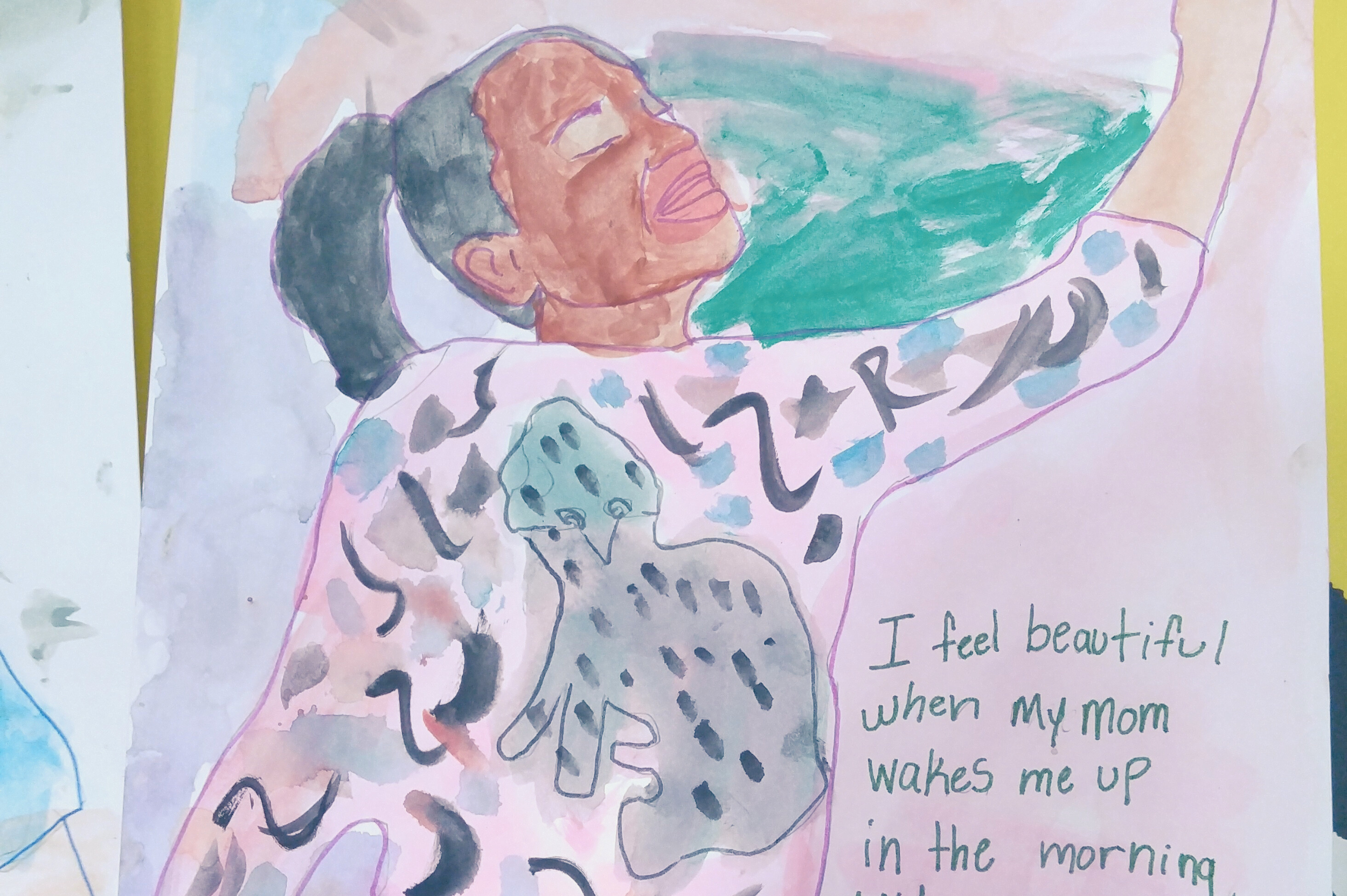Statement in Defense of Black Lives from the
Anti-Racism Committee
We write this with rage, grief, and fierce love for our Black students, teaching artists, and wider community. As an organization, and particularly as an organization that serves Black youth, we recognize that remaining silent is violent and contradictory to our mission.
We mourn the deaths of George Floyd, Breonna Taylor, Tony McDade, Nina Pop, Ahmaud Arbery, Sean Reed, Steven Taylor, David McAtee, and every Black person murdered by the state. As Black people have been naming and creating scholarship around for centuries: this country was founded on anti-Black racial capitalism – on land stolen from indigenous people with labor stolen from Black people. From its origins as a slave patrol, the police force has only shifted in appearance and strategy as it’s maintained its consistent purpose to control and kill Black people.
This moment is about the Black people most recently murdered by police, but it is also about centuries of violence. It is about dismantling these systems of violence – white supremacy, structural racism, anti-Blackness, policing – and putting pressure on power to accept the demands of the many facets of the Black liberation movement.
All anti-Blackness is connected, and all anti-Blackness is lethal to Black people. Microaggressions from white teachers, disproportionate suspensions of Black students, erasure of Black contributions to an art form, low expectations for Black students – all these actions affirm white supremacy and sanction the police to brutalize Black people with impunity.
At the Workshop, we are committed to the work of reflection and revision. How do we apply this same pedagogy to our organization? How can we reimagine our work, our world? We are reflecting on where we have been complicit in these racist systems, how we can transform those policies and behaviors, and how we can show up boldly in our solidarity with Black people, for the liberation of us all.
What is our complicity?
The Workshop has been complicit when we did not have an anti-racist framework and explicit protocol for addressing white supremacy culture for the first 51 years of our organization, when our executive leadership had been exclusively white and our board had been predominantly white for our first 57 years, when we’ve had a high turnover of Black staff, when white fragility is structurally supported and defended, when understanding anti-Blackness and the active practices of anti-racism were not requirements for non-Black teaching artists before leading classrooms of young people forming their worldviews. We are and will continue to reflect on our additional complicities and on how to publicly name those.
What are the actions we’re taking as an organization to change? What are our commitments moving forward?
We commit to revising and refocusing on a clear pathway for Black leadership among teaching artists, the board, and the staff in the next year.
We commit to assessing and shifting the culture of our organization to uplift Black people and allow space for them to show up as they are.
We commit to soliciting feedback to revise our evaluation systems and tools, to create and communicate clear explanations, to check for understanding, and to address and lessen the influence of white supremacy culture in our performance evaluation.
We commit to seek funding to commission our teaching artists, and specifically prioritizing Black teaching artists, to create a new performance and/or gallery showcase at the Powerhouse in the next year. This performance/showcase would be available to students, partners, and District 11 community members at low to no cost, in line with our Community Benefits Agreement for the Powerhouse.
We commit to prioritizing Black artists, students, and community organizations for opportunities to use (at low to no cost) the Powerhouse for rehearsal and performance space.
The Anti-Racism Committee commits to consistently advocating to the board and executive director to take organizational risks to support Black artists, staff members, and board members when those risks are necessary because of the historical white supremacist roots of philanthropy as a field, the white supremacist values both explicit and implicit in professional spaces (as evidenced by the coded meaning of the word “professionalism,” for example), the fact that being white is considered a protected class in human resource law even though whiteness is a privilege, and because Performing Arts Workshop has predominantly white people in leadership positions on staff and a predominantly white board of directors. We recognize that this is not enough. We commit to learning new ways to do the work, to an ongoing and continuous process, and to bravely and boldly addressing internal conflicts towards a more just organization.
In immediate support of ongoing actions In Defense of Black Lives, we commit to:
Supporting Black led organizations on the ground of different uprisings by: educating our stakeholders about the work of these organizations, sharing resources and ways to support these organizations, and creating community building and networking opportunities for our artists and staff to share their own knowledge, resources, and connections as it relates to the Defense of Black Lives.
We commit to engaging with the current uprisings as a part of our Powerhouse curriculum
We commit to soliciting, listening to, and responding to feedback about our structural anti-Blackness with action
We maintain our commitment to integrating our antiracist framework, leading with the specificity of anti-Blackness, frequently and thoroughly into all we do as an organization
We commit to the work of Black liberation until everyone is free.
What actions can you take?
We encourage schools and sites we work with to cut all ties with police.
We encourage donors to commit to funding Black-led organizations with no strings attached. To consider how white supremacy culture influences who you select for funding and the deliverables you attach to that funding. What would be a scary amount to commit to the Black liberation movement? Give more.
We encourage our non-Black partner teachers to engage explicitly with anti-Blackness and uproot it in yourselves, your colleagues, and in your classrooms. Talk to young children about race. Build off of our antiracist framework and adopt it in your spaces.
For individuals looking to take action, there is no shortage of ways to show up. Everyone has a role to play. Consider:
What can you offer?
What skills and resources do you have to contribute to the movement for the long haul?
What connections do you have with power (lawyers, police unions, school boards, people or organizations with money, etc.)?
How can you put public pressure on power to meet the demands of the Movement for Black Lives, Reclaim the Block, and more?
How can you support the sustainability of those on the frontlines?
DONATE DONATE DONATE! We need a radical redistribution of wealth and massive, sustained support for Black-led organizations building power. If you are white or non-Black, redirect your resources, wealth, and connections to Black people. Donate to bail funds, and your local communities.
Read Jocelyn Jackson’s, “Rise Up: An Action Guide,” if you’re unsure where to get started.
Participate in a Week of Action In Defense of Black Lives
Here’s one of many resource lists.
If you’re unable to join the actions in the streets, here are some other ideas for how you can show up:
If you’re white, plug into organizing with Showing Up for Racial Justice (SURJ), Catalyst Project, and Critical Resistance. Support Black-led organizations like Anti Police-Terror Project, CURB, Ella Baker Center, BYP 100, The Movement for Black Lives, and so many more. Here are 5 Ways White People Can Take Action in Response to White and State-Sanctioned Violence.
We’re in this work for the long haul. Thank you for helping hold us accountable.
– The Anti-Racism Committee on behalf of Performing Arts Workshop
The Anti-Racism Committee is a group of Performing Arts Workshop staff and Artist Mentors dedicated to developing and implementing anti-racist practices in the classroom, including specifically pro-Black practices, and pushing the Workshop to establish and practice anti-racism.
During the 2016-2017 school year, Performing Arts Workshop program and artistic staff collaborated on the first iteration of this Anti-Racist Framework. The intention was to create a useful tool for artists to reflect on their teaching practices and find ways to practice anti-racism in their classrooms. We wanted to consider the wide range of experiences with racism within the wide range of Performing Arts Workshop classrooms. We hoped to create norms that teaching artists could adopt to ensure that we were working actively against racism in the classroom. We designed the Anti-Racist Framework to be a living document, one that would be consistently updated and evolving. Thanks to crucial feedback and input from Performing Arts Workshop artistic staff members, we are able to present a new version of the Anti-Racist Framework for 2019. We remain open to an evolving understanding of the practice of anti-racism, and we invite you (the person reading this) to share your thoughts with us.


